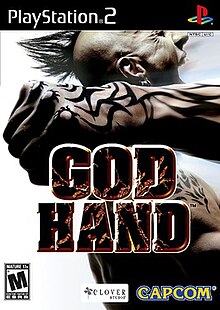
Back جود هاند Arabic جود هاند ARZ God Hand German God Hand Spanish گاد هند Persian God Hand Finnish God Hand (jeu vidéo) French God Hand ID God Hand Italian GOD HAND Japanese
| God Hand | |
|---|---|
 North American box art | |
| Developer(s) | Clover Studio |
| Publisher(s) | Capcom |
| Director(s) | Shinji Mikami |
| Producer(s) | Atsushi Inaba |
| Designer(s) | Hiroki Kato |
| Programmer(s) | Kiyohiko Sakata |
| Artist(s) | Masaki Yamanaka |
| Writer(s) | Hiroki Kato[5] |
| Composer(s) |
|
| Platform(s) | PlayStation 2 |
| Release | |
| Genre(s) | Beat 'em up |
| Mode(s) | Single-player |
God Hand[a] is a 2006 beat 'em up game developed by Clover Studio and published by Capcom for the PlayStation 2. It was released in Japan and North America in 2006, and in 2007 for PAL territories. It was re-released for the PlayStation 3 as a PS2 Classics downloadable game on the PlayStation Network on October 4, 2011. The game was directed by Shinji Mikami, who desired to create the game for hardcore gamers intermixed with a large amount of comic relief. It initially received a mixed response from critics and sold only modestly upon its release in Japan. It was Clover Studio's final video game. Retrospectively, the game has been received more positively and is considered a cult classic.
The game mixes western and Japanese-themed comedy, containing over-the-top characters and storyline events. The gameplay includes traditional elements of the beat 'em up genre with new features, these include being able to map and string together a large repertoire of fighting techniques to the gamepad's face buttons in order to create unique combo attacks. The plot follows a martial artist protecting his companion and wielding a legendary divine arm called the "God Hand", in order to save the world from demons.
- ^ Sinclair, Brendan (October 9, 2006). "Shippin' Out 10/8-10/13: Scarface, God Hand, MK: Armageddon". GameSpot. Archived from the original on June 28, 2016. Retrieved January 21, 2016.
- ^ "PlayStation.com(Japan)|PS World|2006年9月発売のソフト|GOD HAND (ゴッドハンド)" (in Japanese). Sony Computer Entertainment. Archived from the original on April 1, 2009. Retrieved March 29, 2009.
- ^ "God Hand - PlayStation 2 - GameSpy". GameSpy. Archived from the original on August 26, 2009. Retrieved November 12, 2009.
- ^ "New Releases". Gameplanet. Archived from the original on March 20, 2007. Retrieved July 7, 2024.
- ^ 主催者プロフィール (in Japanese). Seminars Village. Archived from the original on April 29, 2011. Retrieved April 29, 2011.
Cite error: There are <ref group=lower-alpha> tags or {{efn}} templates on this page, but the references will not show without a {{reflist|group=lower-alpha}} template or {{notelist}} template (see the help page).